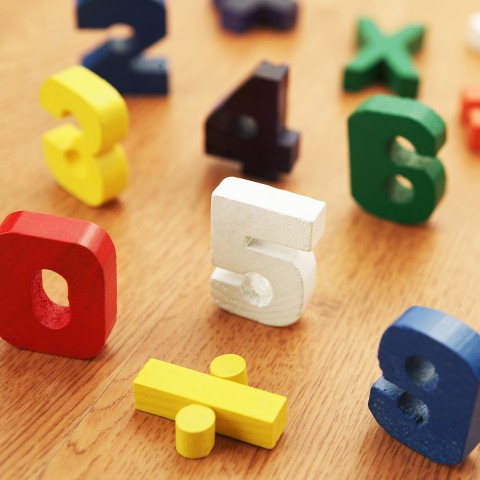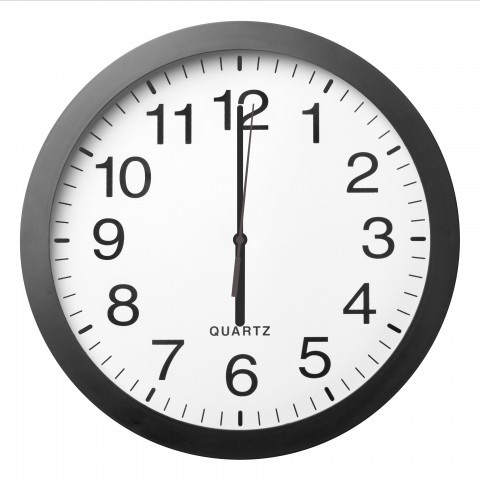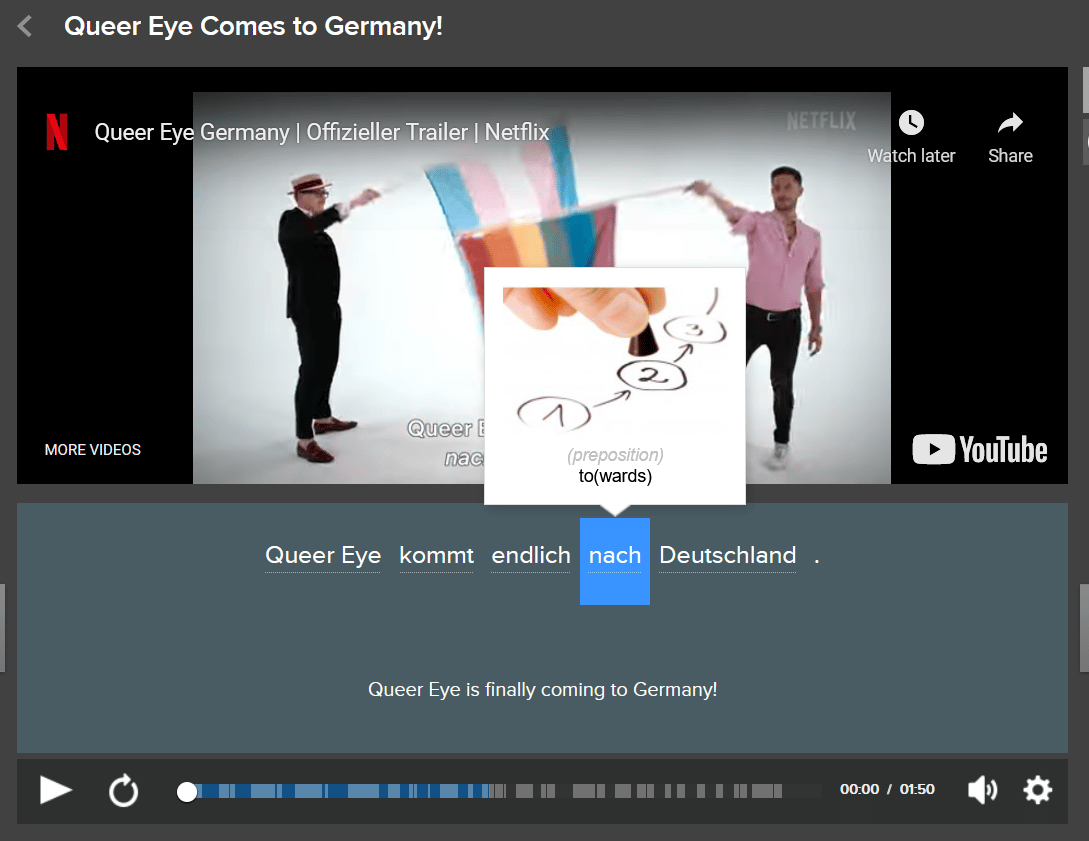If you’ve just started learning German, you might be struggling to get past the beginner stage.
Maybe you feel overwhelmed by the Germanic umlauts on vowels (ä, ö, ü), or maybe that eszett letter (ß). Perhaps it’s the pace of spoken German that’s made you question your decision to start learning.
While there’s definitely truth to those concerns, worry not. There are several short and easy-to-learn words in German that can serve as a springboard while you become familiar with the language.
Memorizing even a few basic German words for beginners will be enough of a stepping stone to help you eventually learn more. This is because many German words are composed of several shorter words that, when combined, have a unique meaning.
Take Kühlschrank, for example. This word is composed of Kühl- which means “cool,” and -schrank which translates to “cupboard.”
Combine the two and you get “cool cupboard,” which is a funny way to describe a refrigerator—the actual meaning of the word Kühlschrank.
Pretty relieving to know this, right?
German isn’t that hard after all. The most difficult part is to summon up the courage to begin.
That’s why we took the time to put together a categorized masterlist of the most essential words in German for beginners.
Without further ado, let’s get right into it…
Table of Contents
- Pronouns
- Numbers
- Nouns
- Verbs
- Adjectives
- Conjunctions
- Others
- Conclusion
1. Pronouns
The first set of words you should add to your German vocabulary are pronouns. These are the words we use to refer to people, places, or things without actually using their names:
- Susan ate the chocolate bar. = She ate the chocolate bar.
Here, we’ll be covering three types of pronouns in German: personal, demonstrative, and interrogative.
Personal Pronouns
We’ll start with personal pronouns, given their importance in sentences. These are crucial for almost any sentence, and we recommend you memorize them by heart before you start with any other words.
| English | German |
| I | ich |
| you | du |
| he | er |
| she | sie |
| it | es |
| we | wir |
| you (plural) | ihr |
| they | sie |
| me | mich / mir |
| you | dich / dir |
| him | ihm / ihn |
| her | ihr |
| us | uns |
| them | ihnen |
Demonstrative Pronouns
Demonstrative pronouns are especially critical for indicating which objects or people you’re referring to in your dialogue. These four basic German words are important to master at the beginner stage.
| English | German |
| this | dieses |
| that | das |
| these | diese |
| those | jene |
Interrogative Pronouns / Question Words
Interrogative pronouns, or the “Five Ws,” are the words we use to ask questions.
| English | German |
| who | wer |
| whom | wen / wem |
| whose | wessen |
| what | was |
| which | welche |
In a similar vein, there are a few interrogative adverbs you should learn at this stage as well:
| English | German |
| when | wann |
| where | wo |
| why | warum |
| how | wie |
2. Numbers
The numbers from one to ten in German are rather similar to those in English. Just like with most languages, learning the first ten digits will help you understand and easily learn the rest of the numbers.
| Numbers | English | German |
| 0 | zero | null |
| 1 | one | eins |
| 2 | two | zwei |
| 3 | three | drei |
| 4 | four | vier |
| 5 | five | fünf |
| 6 | six | sechs |
| 7 | seven | sieben |
| 8 | eight | acht |
| 9 | nine | neun |
| 10 | ten | zehn |
3. Nouns
Nouns are one of the most important parts of speech, so you should memorize as many of them in German as you can. When used with verbs, they create a complete sentence—in a pinch, you can even use them alone to get an urgent point across! Below, you’ll find lists of beginner German nouns you should focus on right away.
Time
Time is king, especially in a country like Germany where punctuality is paramount. Learning time-related vocabulary will come in handy in your day-to-day interactions.
| English | German |
| hour | Stunde |
| minute | Minute |
| morning | Morgen |
| afternoon | Nachmittag |
| evening | Abend |
| day | Tag |
| month | Monat |
| year | Jahr |
| Monday | Montag |
| Tuesday | Dienstag |
| Wednesday | Mittwoch |
| Thursday | Donnerstag |
| Friday | Freitag |
| Saturday | Samstag |
| Sunday | Sonntag |
People
These are the words you’d learn in the first lesson of probably any German beginner copybook.
| English | German |
| butcher | Metzger (m.) / Metzgerin (f.) |
| woodman | Holzfäller (m.) / Holzfällerin (f.) |
| police officer | Polizist (m.) / Polizistin (f.) |
| doctor | Arzt (m.) / Ärztin (f.) |
| nurse | Krankenpfleger (m.) / Krankenschwester (f.) |
| firefighter | Feuerwehrmann (m.) / Feuerwehrfrau (f.) |
| teacher | Lehrer (m.) / Lehrerin (f.) |
| father | Vater |
| mother | Mutter |
| sister | Schwester |
| brother | Bruder |
| Mr. | Herr |
| Ms. | Frau |
Places Around Town
If you’re traveling in Germany, whether in one town or around the country, these words will help you get by and even ask for directions.
| English | German |
| hospital | Krankenhaus |
| supermarket | Supermarkt |
| school | Schule |
| downtown | Innenstadt |
| university | Universität |
| city hall | Rathaus |
| main square | Hauptplatz |
| bank | Bank |
| museum | Museum |
| restaurant | Restaurant |
| café | Café |
| police station | Polizeistation |
| train station | Bahnhof |
| bus station | Bushaltestelle |
School/Office Essentials
If you have to study or work in Germany, these words will be helpful when you’re in class or at the office.
| English | German |
| pen | Kugelschreiber |
| notebook | Notizbuch |
| computer | Computer |
| pencil case | Federmappe |
| headphones | Kopfhörer |
| mouse | Maus |
| keyboard | Tastatur |
| wifi | WLAN |
| charger | Ladegerät |
| cable | Kabel |
| backpack | Rucksack |
| desk | Schreibtisch |
| copybook | Heft |
Body Parts
| English | German |
| eye | Auge |
| nose | Nase |
| ear | Ohr |
| face | Gesicht |
| arm | Arm |
| chest | Brust |
| cheek | Wange |
| forehead | Stirn |
| mouth | Mund |
| chin | Kinn |
| armpit | Achselhöhle |
| abdomen | Bauch |
| leg | Bein |
| toe | Zeh |
| finger | Finger |
| ankle | Knöchel |
| hip | Hüfte |
| forearm | Unterarm |
| elbow | Ellbogen |
| wrist | Handgelenk |
Food
Germans are proud of their cuisine and German culture values eating healthy, fresh food rather than buying frozen or ready-to-eat meals. Here’s a list of words for your next grocery shopping spree.
| English | German |
| ٍٍvegetables | Gemüse |
| fruit | Obst |
| meat | Fleisch |
| milk | Milch |
| egg | Ei |
| coffee | Kaffee |
| yogurt | Joghurt |
| bread | Brot |
| bacon | Speck |
| pie | Kuchen |
| ham | Schinken |
| chicken | Huhn |
| juice | Saft |
| sausage | Wurst |
4. Verbs
As a beginner in German, you’ll greatly benefit from picking up the most commonly used verbs. Learning them together with nouns will give you a headstart when it comes to forming sentences and communicating with others.
Daily Routine Verbs
If you’re into daily journaling, doing that in German will require you to know a set of daily routine-related verbs. Here’s a list to get you started:
| English | German |
| to get up | aufstehen |
| to eat | essen |
| to drink | trinken |
| to go | gehen |
| to work | arbeiten |
| to study | studieren |
| to drive | fahren |
| to ride | reiten |
| to sleep | schlafen |
| to wake up | aufwachen |
| to hang | hängen |
| to do laundry | Wäsche machen |
| to nap | ein Nickerchen machen |
| to work out | trainieren |
| to go out | ausgehen |
| to prepare | vorbereiten |
| to cook | kochen |
| to clean | putzen |
| to wash | waschen |
| to tidy up | aufräumen |
| to connect | verbinden |
| to communicate | kommunizieren |
| to wear | tragen |
| to warm up | aufwärmen |
| to grab | greifen |
| to mix | mischen |
| to hold | halten |
| to freeze | einfrieren |
| to change | wechseln |
| to move | bewegen |
Other Common Verbs
| English | German |
| to give | geben |
| to get | bekommen |
| to do | tun |
| to make | machen |
| to let | lassen |
| to ask | fragen |
| to smile | lächeln |
| to find | finden |
| to use | benutzen |
| to take | nehmen |
| to come | kommen |
| to look | schauen |
| to hear | hören |
| to smell | riechen |
| to talk | sprechen |
| to exit | gehen |
| to call | rufen |
| to feel | fühlen |
| to answer | antworten |
| to laugh | lachen |
| to cry | weinen |
| to steal | stehlen |
| to run | rennen |
| to walk | gehen |
| to meet | treffen |
| to create | erschaffen |
| to finish | beenden |
5. Adjectives
Using adjectives in your speech or writing can add a layer of meaning and help you better express yourself. To get you started, here are a few beginner German adjectives in different categories.
Describing Objects
| English | German |
| big | groß |
| small | klein |
| long | lang |
| short | kurz |
| round | rund |
| rectangular | rechteckig |
| smooth | glatt |
| rough | rau |
Describing People
| English | German |
| pretty | hübsch |
| handsome | gutaussehend |
| tall | groß |
| short | klein |
| disgusting | ekelhaft |
| sociable | kontaktfreudig |
| funny | lustig |
| beautiful | schön |
| lovely | lieblich |
| caring | fürsorglich |
| selfless | selbstlos |
| arrogant | arrogant |
| humble | bescheiden |
| courageous | mutig |
| weak | schwach |
| strong | stark |
| quirky | schrullig |
Describing Emotions
Being able to describe our own emotions is critical for well-being and also helps us better understand others. Here’s a list of adjectives for describing emotions:
| English | German |
| happy | glücklich |
| sad | traurig |
| joyful | freudig |
| angry | sauer |
| depressed | depressiv |
| anxious | ängstlich |
| stressed out | gestresst |
| jolly | fröhlich |
Describing Weather
| English | German |
| rainy | regnerisch |
| wet | nass |
| humid | feucht |
| dry | trocken |
| arid | dürr |
| cool | kühl |
| frigid | kalt |
| foggy | neblig |
| windy | windig |
| stormy | stürmisch |
| breezy | luftig |
| windless | windstill |
| calm | ruhig |
6. Conjunctions
| English | German |
| and | und |
| but | aber |
| then | dann |
| because | weil |
| so | so / also |
7. Others
Below is a short list of filler words that Germans use in their conversations. Using these will make you sound like a native and they’ll come in handy in many situations.
| English | German |
| I see (sudden understanding) | ach so |
| sure | klar |
| simply | halt |
| well | tja |
| already | schon |
8. Conclusion
Armed with these German beginner words, you’ll be able to understand even more of the spoken language than you may have thought (thanks to those nifty word combinations!). How many of these words were new to you? And how many did you know already? We look forward to hearing from you in the comments!
As you read more German, pay attention to how different words are composed. You’ll often notice they can be broken down into parts, which will help you derive their meanings more easily.
Your goal should be to learn around 1000 German words; statistically, that’d cover 85.5% of all words you hear.
In other words, if you learn 1000 words, you’ll be able to speak German almost fluently. You’ll only have issues expressing yourself 14.5% of the time.
Memorize the 200+ from our list, and you’ll only be 800 words away from fluency.
Wondering where and how to learn those other 800 words?
Buckle up and head to GermanPod101.com.
Here, you can access lessons and word lists for the most important day-to-day vocabulary. Our lessons all feature the most effective learning tools, such as flashcards, slideshows, slowed-down audio, line-by-line breakdowns, and more.
You can also opt for 1-on-1 guidance from a language expert to answer your questions. Your private tutor can even give you a personalized learning program to match your learning goals.
You can get all of this and more by signing up for free on the GermanPod101 website.
No credit card or unnecessary information required.
Sign up here and access our materials from your desktop or mobile phone.
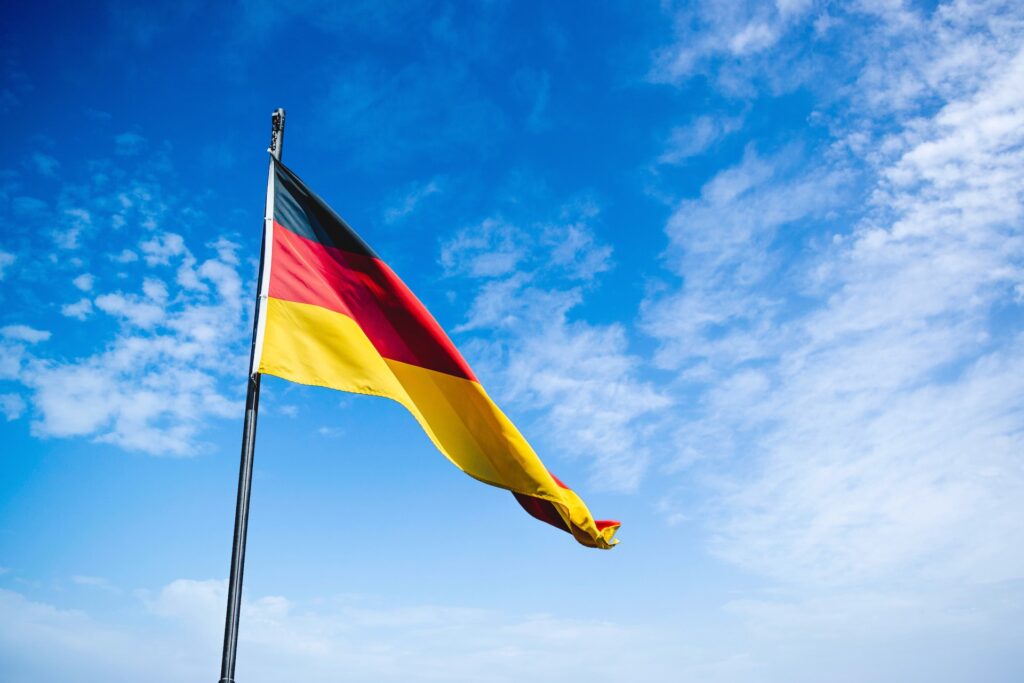
By
Last updated:
January 11, 2023
There are hundreds of thousands (potentially millions) of German words hanging around, just waiting to be learned and used.
But as a newcomer to the language, you’ll need to prioritize certain ones.
I’ll show you the most important 150 German words you should learn first.
I’ve chosen them based on frequency and usefulness. Learn these, and you’ll be much better off in your next German conversation.
Contents
- Common German Nouns
- German Prepositions
- German Pronouns
- Common German Phrases
- German Verbs
- German Adjectives
- German Body Parts
- German Numbers
- German Time and Seasons
Download:
This blog post is available as a convenient and portable PDF that you
can take anywhere.
Click here to get a copy. (Download)
Common German Nouns
German nouns are gendered and paired with the appropriate pronoun: der is the masculine pronoun, die is feminine, das is neuter and die is also used for plural nouns. Let’s go over some of the critical ones you should know.
1. der Mann — man
2. die Frau — woman
3. das Kind — child
4. der Junge — boy
5. das Mädchen — girl
6. der Freund — friend
7. die Leute — people (plural)
8. die Familie — family
9. die Arbeit — work
10. die Stadt — city
11. das Ding — thing
12. das Beispiel — example
13. die Frage — question
14. das Problem — problem
15. das Leben — life
16. das Geld — money
17. das Essen — food
18. das Haus — house
German Prepositions
German prepositions take different cases. Some can take on more than one, with a rule of thumb being that the dative is used for stasis or location and the accusative used for describing movement or a change of state.
Be aware that using the wrong case can imply a different meaning!
19. von — by, of, from (dative)
20. um — about, around, at (accusative)
21. zu — to, towards (dative)
22. bis — until, by, up to (accusative)
23. an — to, on (accusative or dative)
24. auf — on, to, upon (accusative or dative)
25. aus — from, out of (dative)
26. bei — by, at, near, in (dative)
27. seit — since, for (dative)
28. für — for (accusative)
29. vor — before, in front of (dative)
30. nach — after, towards (dative)
31. in — in (accusative or dative)
32. durch — through (accusative)
33. mit — with (dative)
34. neben — beside, near (dative)
German Pronouns
German pronouns can be a little tricky for learners because they change depending on the case and, at times, gender. We’ll go over the pronouns in their nominative, accusative and dative forms (in that order).
35. ich / mich / mir — I / me
36. du / dich / dir — you (informal, singular)
37. er / ihn / ihm — he / him / it (for masculine nouns)
38. sie / sie / ihr — she / her / it (for feminine nouns)
39. es / es / ihm — it (for neuter nouns)
40. wir / uns / uns — we / us
41. ihr / euch / euch — you (informal, plural)
42. sie / sie / ihnen — they / them
43. Sie / Sie / Ihnen — you (formal, singular and plural)
Common German Phrases
Few conversations would feel complete without the bare essentials of phrases. These are the basic German phrases and expressions that you’re bound to use in any chat you have, no matter how long or short.
44. Hallo — Hello
45. Guten Morgen — Good morning
46. Guten Abend — Good afternoon
47. Gute Nacht — Good night
48. Ich heiße… — My name is…
49. Wie geht’s? — How are you? (informal)
50. Auf Wiedersehen — Goodbye / See you again
51. Tschüss — Bye
52. Gesundheit — Bless you
53. Ja — Yes
54. Nein — No
55. Vielleicht — Maybe / Perhaps
56. Bitte — Please / You’re welcome
57. Entschuldigung — Excuse me
58. Danke — Thanks
59. Es tut mir leid — I’m sorry
60. Genau — Exactly / That’s right
61. Ach so — I see
German Verbs
Off to do something? Hopefully you know how to say so in German. Here are some common German verbs that will get you going.
62. sein — to be
63. haben — to have
64. machen — to make, do
65. gehen — to go
66. nehmen — to take
67. bringen — to bring
68. werden — to become
69. wollen — to want
70. wissen — to know (information)
71. kennen — to know (a person or place)
72. können — can, to be able to
73. mögen — to like
74. denken — to think
German Adjectives
Luckily, many adjectives in German sound quite similar to their English counterparts. Just don’t forget that in German, adjectives are also conjugated when paired with nouns.
75. gut — good
76. schlecht — bad
77. klein — small
78. groß — big, tall
79. schön — handsome, beautiful, lovely, nice
80. fantastisch — fantastic
81. traurig — sad
82. müde — tired
83. neu — new
84. alt — old
85. jung — young
86. kalt — cold
87. heiß — hot
88. kurz — short
89. lang — long
90. viel — a lot / very
91. wenig — a little
German Body Parts
Knowing how to describe the body parts in German is essential for beginner learners. Here are some of the crucial body parts you should know right away.
92. der Körper — body
93. der Kopf — head
94. das Gesicht — face
95. die Augen — eyes
96. die Nase — nose
97. der Mund — mouth
98. der Hals — neck
99. die Schulter — shoulder
100. die Brust — chest / breast
101. der Rücken — back
102. der Bauch — stomach
103. der Arm — arm
104. die Hand — hand
105. das Bein — leg
106. der Fuß — foot
German Numbers
Counting in German is pretty simple, but you’ll of course have to get familiar with the numbers first. No worries—they should be pretty quick to memorize!
107. null — zero
108. eins — one
109. zwei — two
110. drei — three
111. vier — four
112. fünf — five
113. sechs — six
114. sieben — seven
115. acht — eight
116. neun — nine
117. zehn — ten
118. elf — eleven
119. zwölf — twelve
120. dreizehn — thirteen
121. vierzehn — fourteen
122. fünfzehn — fifteen
123. sechzehn — sixteen
124. siebzehn — seventeen
125. achtzehn — eighteen
126. neunzehn — nineteen
127. zwanzig — twenty
128. dreißig — thirty
129. vierzig — forty
130. fünfzig — fifty
131. sechzig — sixty
132. siebzig — seventy
133. achtzig — eighty
134. neunzig — ninety
135. hundert — one hundred
136. tausend — one thousand
German Time and Seasons
Words associated with time in German and the time of year are also one of the first things on the beginner learner’s agenda. So make sure to start learning these!
137. die Zeit — time
138. früh — early
139. spät — late
140. die Uhr — clock / o’clock (pronoun removed)
141. die Stunde — hour
142. die Minute — minute
143. der Tag — day
144. die Woche — week
145. der Monat — month
146. das Jahr — year
147. der Winter — winter
148. der Frühling — spring
149. der Herbst — fall
150. der Sommer — summer
150 words sounds like a lot, but remember, these are just the tip of the German language iceberg! Our complete guide on how to learn German vocabulary is here.
And as you’re learning more and more, avoid any vocabulary faux pas by using a program like FluentU, which lets you hear words spoken in context by native German speakers using authentic video content.
You can watch the words being used in content like movie clips, music videos and commercials—aided by subtitles with on-demand definitions, multimedia flashcards, transcripts and personalized exercises.
Perhaps most importantly, the FluentU dictionary is contextual, so you’ll be seeing definitions specific to the situations where they appear.
Once you’re confident with the essentials, you can plow forward and indulge in all the other fun and quirky words unique to German!
Download:
This blog post is available as a convenient and portable PDF that you
can take anywhere.
Click here to get a copy. (Download)
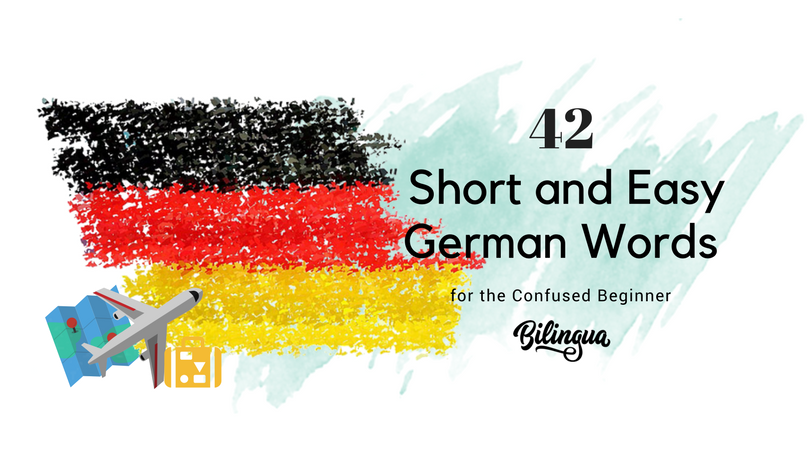
March 15, 2018
German is one of the most widely spoken languages in Europe. Aside from Germany, it’s spoken amongst people in Austria, Switzerland, Austria, Liechtenstein and Luxembourg. German has been considered the language of commerce and business in Europe. The Germans are proud engineers and have been are the forefront of manufacturing high-end mechanics for a while. German people are proud and honest. If you ask someone how they are in German then don’t be surprised if they give you a starkly honest answer! However, to the beginner, German words can get overwhelming! But fret not, there ARE short and easy German words that are easy to learn and use.
The language has often been considered hard to learn due to its 3 genders and long, winding words. It holds many similarities to English, too, though. German vocab will actually bear many resemblances to English. The words zeitgeist, angst and kindergarten are all German. English is the closest language to German after Dutch. Also, some people love getting their tongues round German’s super-long words. If it suits your talking style then you will love pronouncing German!
1. Be aware there is a standardised form of spoken German.
This means German spoken around the world will be very similar.
2. German words are designed to give indications on pronunciation.
The sounds are always the same, regardless of what word they appear in. German pronunciation is pretty rigid. Once you know your way around the way it works, it is very simple (even though the words look very complex!). Also, it’s obvious but German uses the same 26 letters as English with the simple additions of ß and three vowels with umlauts: ä, ö and ü.

3. Be aware Germans will correct you!
This is great, and they won’t do it rudely, either!
4. Focus on genders.
German has masculine, neuter and feminine genders. It’s very hard to predict what gender most nouns are. You can’t just not bother with them, either, as the meaning of the phrase changes according to the gender!
This list will give you a good idea of how German words resemble English in both obvious and subtle ways. Try and spot the similarities in how words are pronounced, too. For example, there are many words here ending in ‘en’.
Here’s a list of short and easy German words anyone can learn quickly.
42 Short and Easy German Words
- Hallo – Hello
- Danke – Thank You
- Nein – No
- Ja – Yes
- Lecker – Delicious
- Woche – week
- Heute – today
- Morgen – tomorrow
- Gestern – yesterday
- Machen – do
- Gehen – go
- Kommen – come
- Lachen – laugh
- Good – gut
- Schön – beautiful
- Kaffee – coffee
- Bier – beer
- Tee – tea
- Wein – wine
- Wasser – water
- Lamm – lamb
- Fisch – fish
- Nett – nice
- Sauber – clean
- Fein – fine
- Lieb – dear
- Liebe – love
- Komisch – funny
- Klasse – great
- Hoch – high
- Prima – fantastic
- Stark – Strong
- Lang – long
- Hell – bright
- Fähig – capable
- Kurz – short
- Klein – small
- Groß – Big
- Wunderbar – wonderful
- Ratte – rat
- Dunkel – dark
- Bye – Tschüss
Check out these articles to up your language learning game:
The Best Apps to Learn Arabic for Free
Ordering Food in Spanish – How Not to Starve! [INFOGRAPHIC]
How to Say Hello in 100 Languages
Planning a trip to a German-speaking country? Or perhaps you are starting to learn German? You’ll need a list of the most basic German words and phrases.
From the simplest German words to the phrases you need to get by, here’s the list you need together with:
- its English translation, and
- a phonetic pronunciation guide
At the end of each section, you can also take the mini quizzes to make sure the words stick to your memory.
Ready? Let’s begin!
I. The Very Basics
Let’s start with the basic German words and phrases. With just these in your arsenal, you can already survive the simplest conversations!
LEARN GERMAN WORDS AND EXPRESSIONS NOW!
SIGN UP NOW TO GET THESE FOR FREE!
- 100 Days of German Words and Expressions E-book
- 300 Useful German Adjectives
| German word / phrase | English translation | Pronunciation |
|---|---|---|
| hallo | hello | hello |
| Ja | Yes | ya |
| Nein | No | niyn |
| Bitte | Please | bi-te. |
| Danke | Thank you | dân-ke |
| Bitte schön. | you’re welcome | bi-te shurn |
| Entschuldigen Sie. | Excuse me (getting attention) | ent-SHOOL-dee-gun zee |
| Entschuldigung! | Excuse me (sorry, asking pardon) | ênt-shool-dee-goong |
| Wie heißen Sie? | What’s your name? | vee hays-en zee? |
| Ich heiße…. | My name is… | iH hays-e…. |
| Freut mich | Pleased to meet you | froyt miH |
Mini Quiz 1
1. What does bitte schön mean?
Click to reveal the answer
2. Entschuldigen Sie and Entschuldigung both mean excuse me. But what makes them different from each other?
Click to reveal the answer
3. To say “pleased to meet you”, you say:
Click to reveal the answer
You can learn more German greetings in this article: A Quick Guide to German Greetings
II. Simple Questions
Now let’s talk about the simplest German questions. There’s another article here in this website that talks about this with more detail.
You can check it out here: Basic German Questions Every Traveler Should Know
For now let’s just run through the most simple ones that you can memorize quickly.
| Wo? | Where? | vo |
| Wann? | When? | van |
| Wie? | How? | vee |
| Warum? | Why? | va-room |
| Wer? | Who? | vair |
| Welches? | Which? | vel-shes |
| Wo ist…? | Where is…? | vo ist |
| Wie viel? | How much? | vee feel |
| Wie viele? | How many? | vee feel-e |
| Was ist das? | What’s that? | vass ist dass |
Mini Quiz 2
1. How do you ask “why?” in German?
Click to reveal the answer
2. What does “wo ist..?» mean
Click to reveal the answer
3. True or false: wie in German means who
Click to reveal the answer
Expressing likes or dislikes
In daily life, you’ll always be faced with different choices. Which one should you take? Which one do you like? Do you hate the one in front of you? Speak your mind with these simple German phrases!
| Ich hätte gern… | I’d like… | ixh hett-er gairn… |
| Ich möchte… | I want… | ixh merxht-er |
| Es gefällt mir. | I like it. | ess ge-felt meer |
| Es gefällt mir nicht. | I don’t like it. | ess ge-felt meer nixht |
| In Ordnung/Einverstanden. | OK/Agreed. | in ord-noong/iyn-fer-shtan-den |
| Das ist gut. | That’s good / That’s fine. | dass ist goot |
| Ich will/Wir wollen… | I want/We want… | ixh vill/veer voll-en |
| Ich bin/Wir sind… | I am/We are…. | ixh bin/veer zint |
| Ich habe/Wir haben… | I have/We have… | ixh har-ber/veer har-b |
Mini Quiz 3:
1. To say “I want…” in German, you say:
Click to reveal the answer
2. Das ist gut means
Click to reveal the answer
3. When you like something, you say:
Click to reveal the answer
Speaking Difficulties
When you’re in a place where you don’t speak the language that well, there’s bound to be some conversational hiccups. Solve any speaking difficulties you might have with the help of these useful phrases.
| Sprechen Sie Englisch? | Do you speak English? | shprêH-en zee êng-lish? |
| Ich kann nicht [so gut] Deutsch sprechen. | I can’t speak German (well). | eesh kahn nikht [zo goot] doytsh shpreH-en |
| Ich verstehe nicht. | I don’t understand. | ixh fair-shtay-er nixht |
| Können Sie das bitte wiederholen? | Can you repeat that please? | kern-en zee dâs bi-te vee-der-hoh-len? |
| Könnten Sie bitte langsamer sprechen? | Would you be able to speak slower please? | kern-en zee bi-te lâng-zâm-er shprêH-en? |
Needing Help
Need help finding your way around? Or perhaps it’s a different type of emergency? Here are some basic German phrases to help get you un-stuck!
| Würden Sie mir bitte helfen? | Would you help me please? | vuer-den zee meer bi-te hêl-fen? |
| Ich weiß nicht | I don’t know | ixh viyss nixht |
| Ich habe mich verirrt. | I’m lost. | eesh HAH-buh meesh fer-EERT |
| Kannst du/Können Sie mir das auf der Karte zeigen? | Can you show me on the map? | kahnst doo/KOON-en zee meer dahss ouf dayr KAHR-tuh TSIGH-gen? |
| Ich kenne mich hier nicht aus. | I don’t know my way around here. | iH kên-e miH heer niHt ous. |
Mini Quiz 4
1. Ich verstehe nicht means
Click to reveal the answer
2. How do you say “I’m lost” in German?
Click to reveal the answer
3. Würden Sie mir bitte helfen? Means
Click to reveal the answer
Conclusion
There you go with the most basic survival words and phrases in German. With these in your back pocket, you’re ready to take on a few conversations in German—with correct pronunciation, too!
To expand your vocabulary and boost your reading and listening skills, check out German short stories below!
A FUN AND EFFECTIVE WAY TO LEARN GERMAN
- 10 entertaining short stories about everyday themes
- Practice reading and listening with 90+ minutes of audio
- Learn 1,000+ new German vocabulary effortlessly!
200+ List of the Most Common German Words
By OptiLingo • 10 minute read
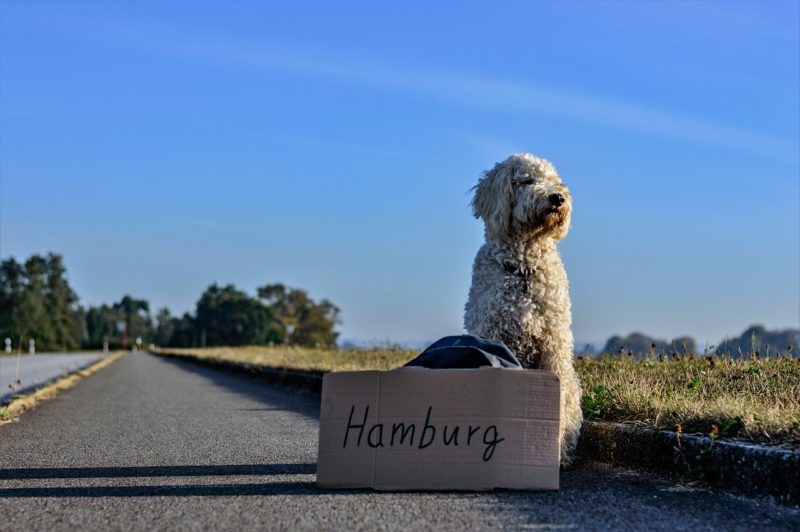
When you learn a new language, you need to know the core vocabulary. Without these words, you can’t form sentences, and can’t express your ideas. But, once you add these German words to your vocabulary, you’re guaranteed to reach fluency. And if you add the right words, you’ll achieve your goals even faster. Here’s why you should focus on the most common vocabulary, and then a list of 200+ of those words in German.
Fluency Isn’t About How Many Words You Know
A lot of students try to cram in as many words as they can. They brag that they learned hundreds of new German words, and they even know the most obscure words in German. Good for them. But, this doesn’t mean they’re fluent. If they try to whip up their newfound knowledge in a real conversation, they’ll fall flat.
That’s because fluency isn’t about how many German words you know. It’s about knowing the right German words. Learning only the most common and most used German words doesn’t just make you a good conversation partner. You’ll also reach fluency much faster.

Psst! Did you know we have a language learning app?
You’re only one click away!
Use the 80/20 Principle to Learn Common German Words
If you don’t believe me that you should only concentrate on the most common words, hopefully, you’ll believe science. 80% of everyday German conversations comes from 20% of the total vocabulary. It’s called the Pareto Principle, or the 80/20 rule. And you can use this to reach fluency faster.
If you only learn that 20% of the German language, you can take part in 80% of the conversations. So, with only a little effort, you can have a lot of success already. But, which exact words are part of that 20%?
Well, the following list includes the most 200 common German words. That’s a great start. But, if you’re hungry for more, you can easily access the full list with the OptiLingo app. This reliable language learning method gives you pronunciation practice and a list of the most useful German vocabulary at the same time.
200+ Common German Words
You’ll definitely need these 222 German words to speak German fluently. We divided them according to their grammatical categories, so it’s even easier for you to focus on one group at a time. Of course, there are way more words in the German language. But, once you know these, speaking German will only be a matter of grammar.
List of Common German Nouns
German Nouns |
Translation |
|
das Beispiel, -e |
example |
|
das Ende, -n |
end |
|
das Geld |
money |
|
das Haus, -¨er |
house |
|
das Jahr, -e |
year |
|
das Kind, -er |
child |
|
das Land, -¨er |
country, land |
|
das Leben |
life |
|
das Mädchen |
girl |
|
das Mal, -e |
time (number of times) |
|
das Problem, -e |
problem |
|
das Prozent, -e |
percent |
|
das Recht, -e |
right, law |
|
der Abend |
evening, eve, night |
|
der Fall, -¨e |
fall, case |
|
der Freund |
friend |
|
der Herr, -en |
man, gentleman, Mr. |
|
der Junge, -n |
boy |
|
der Mann, -¨er |
man |
|
der Mensch, -en |
human being, man |
|
der Tag, -e |
day |
|
der/das Teil, -e |
part |
|
die Angst |
fear, anxiety |
|
die Arbeit, -en |
work, job |
|
die Frage, -n |
question |
|
die Frau, -en |
woman, wife, Mrs. |
|
die Hand, -¨e |
hand |
|
die Leute |
people |
|
die Million (Mio.), -en |
million |
|
die Stadt, -¨e |
city |
|
die Welt, -en |
world |
|
die Zeit |
time |
List of the Most Common German Verbs
German Verbs |
Translation |
|
anrufen |
to call, phone |
|
arbeiten |
to work |
|
bleiben |
to stay, remain |
|
brauchen |
to need |
|
bringen |
to bring |
|
denken |
to think |
|
dürfen |
may, to be allowed |
|
finden |
to find |
|
geben |
to give; to put; to deal; there is/are |
|
gehen |
to go, walk; to leave; to work; to be in progress, last; to be going; to approach |
|
glauben |
to believe |
|
haben |
to have |
|
heißen |
to be called |
|
kommen |
to come |
|
können |
can, to be able to |
|
lassen |
to let, allow, have done |
|
leben |
to live |
|
liegen |
to lie, be lying |
|
machen |
to make, do, prepare; to produce; to go; to put |
|
müssen |
must, to have to |
|
nehmen |
to take |
|
sagen |
to say, tell |
|
sehen |
to see, look; to take care of; to view, watch, observe; to notice |
|
sein |
to be, to have, to exist, there is / it is |
|
sollen |
should, ought to |
|
stehen |
to stand |
|
tun |
to do |
|
wissen |
to know |
|
wollen |
to want |
|
werden |
to get, to become; will, to be going to; to be done (forms the passive voice) |
List of the Most Common German Adjectives
German Adejectives |
Translation |
|
alt |
old |
|
anz |
whole, all the |
|
deutsch |
German |
|
eigen |
own |
|
erste, -r, -s |
first |
|
genau |
exact |
|
gleich |
equal, same |
|
groß |
big, large, great |
|
gut |
good |
|
hoch |
high, tall |
|
jung |
young |
|
klein |
small, little |
|
kurz |
short |
|
lang |
long |
|
letzte, -r, -s |
last |
|
möglich |
possible |
|
neu |
new |
|
richtig |
right, correct |
|
spät |
late |
|
stark |
strong |
|
verschieden |
different, diverse |
|
weitere, -r, -s |
additional |
|
wichtig |
important |
|
wirklich |
real, true, natural |
|
besser |
better, preferably |
|
einfach |
easy, simple, plain; single, one-way; simply, just |
|
schön |
beautiful, lovely; good, great; nice; fine (adjective); well, beautifully; nicely; really (adverb) |
|
viel |
much, a lot |
|
weiß |
white (adjective) |
|
genug |
enough |
|
los |
loose, not attached, rid of |
List of Common German Adverbs
German Adverbs |
Translation |
also |
so, therefore |
|
auch |
also, too, as well |
|
da |
there |
|
dabei |
there, here, then, so (adverb); since, as, given that (conjunction) |
|
dafür |
for this |
|
dann |
then, after that |
|
davon |
from that |
|
doch |
but, still |
|
dort |
there |
|
eben |
just now |
|
eigentlich |
actually |
|
erst |
first, only, not until |
|
gar |
at all |
|
heute |
today, nowadays |
|
hier |
here |
|
immer |
always |
|
jetzt |
now; yet |
|
mehr |
more |
|
natürlich |
naturally, of course |
|
nicht |
not |
|
nie |
never |
|
noch |
still, yet |
|
nun, nu |
now |
|
nur |
only, merely, just; |
|
oben |
above, up there |
|
schon |
already |
|
sehr |
very |
|
so |
so, thus, this way, such |
|
vielleicht |
perhaps, maybe |
|
warum |
why |
|
weit |
widely, far |
|
wieder |
again |
|
zurück |
back, backwards |
|
ganz |
all, all the, every, everything, everybody, everyone |
|
gerade |
just |
|
aber |
again (adverb); but, though (conjunction) |
|
damit |
with it, thereby; so that, in order that |
|
wo |
where, somewhere; when |
|
wie |
how (adverb); like, as (conjunction) |
|
ja |
yes; really, definitely; of course (adverb); a yes (capitalized as a noun – Ja) |
|
nein |
no; a no |
Common German Conjunctions to Make Sentences
German Conjunctions |
Translation |
|
als |
than, when, as, while, as if |
|
bevor |
before |
|
beziehungsweise |
or, respectively |
|
dass |
that |
|
denn |
because |
|
entweder…oder |
either…or |
|
falls |
in case, if |
|
indem |
while, by |
|
nachdem |
after |
|
ob |
whether |
|
obwohl |
although |
|
oder |
or |
|
so dass |
so that |
|
sobald |
as soon as |
|
solange |
as long as |
|
sondern |
but (rather) |
|
sowie |
as well as |
|
sowohl … und |
both |
|
und |
and |
|
weder noch |
neither … nor |
|
weil |
because |
|
wenn |
if, when, whenever |
|
zumal |
particularly, especially |
List of the Most Common German Pronouns
German Pronouns |
Translation |
|
diese |
this, these |
|
ein |
a, an |
|
andere |
other, different, next |
|
kein |
no, not a, not an; |
|
man |
one, they, you |
|
nichts |
nothing |
|
all |
all, all the, every, everything, everybody, everyone |
|
etwas |
some, something, any (pronoun); somewhat, slightly, a little, a bit (adverb); something (capitalized as a noun – Etwas) |
|
ach |
oh! |
|
bitte |
please, you’re welcome, excuse me, please do, go ahead; request, plea (capitalized as a noun – die Bitte); to ask (inflection of the verb “bitten”) |
|
danke |
thank you!, thanks!; inflection of the verb “danken” |
|
was |
what (interrogative); which (relative) |
|
wer |
who; the person who; somebody, someone |
German Personal and Reflexive Pronouns
German Pronouns |
Translation |
|
du |
you (informal, singular) |
|
er |
he, it |
|
es |
it |
|
euch |
you, yourselves (plural ) |
|
ihm |
him, to him |
|
ihn |
him, it |
|
ihnen |
them, to them |
|
mir |
me, to me |
|
Sie |
you (polite, singular or plural) |
|
sie |
she, it; they, you |
|
wir |
we |
|
ihr |
you, you all (plural, informal); her, to her ; her, its, their |
|
dich |
you; yourself |
|
dir |
you, to you; yourself, to yourself |
|
uns |
us; ourselves |
|
mich |
me, myself |
|
ich |
I (not capitalized); ego (capitalized – Ich) |
|
deine |
your |
|
ihre |
hers, its, theirs |
|
Ihre |
yours (singular and plural) |
|
mein |
my |
|
am |
on, at, on the, at the |
|
an |
to, on, at, by, about, against |
List of Common German Prepositions
German Prepositions |
Translation |
|
am |
on, at, on the, at the |
|
an |
to, on, at, by, about, against |
|
auf |
on, onto, at |
|
aus |
out of, from |
|
bei |
by, near, with, at |
|
durch |
through, by means of |
|
für |
for |
|
gegen |
against |
|
gegenüber |
across from |
|
hinter |
behind, in back of |
|
im |
in the |
|
in |
in |
|
in |
in, within, at, pertaining to |
|
ins |
to the, into the |
|
mit |
with |
|
nach |
after, to, toward |
|
neben |
beside, next to |
|
ohne |
without |
|
seit |
since, for a period of time |
|
über |
above, over, about |
|
um |
around, at |
|
unter |
under |
|
von |
from, of |
|
vor |
in front of, before, ago |
|
während |
during |
|
wegen |
because of |
|
zu |
to, at |
|
zwischen |
between |
|
ab |
from, as of (preposition); off, away (adverb) |
|
bis |
to |
|
sich |
oneself, itself, himself, herself, themselves |
How to Learn This List of Common German Words
Now you’ve got 222 German words. That’s great, but what’s next? Well, you need to learn them. Having them here, or even on a piece of paper won’t make this knowledge yours. So, how can you learn these German words fast and effectively? Here are a few tricks you can use to commit them to your long term memory effortlessly:
- Don’t cram! Let’s start off with what not to do. Never, under any circumstances, try to cram German vocabulary. Forcing yourself to remember a lot in a short time only leads to two things: you’ll hate your lessons and you won’t actually commit them to your long term memory. Try one of the following techniques instead:
- Try chunking: Chunking is a great memory aid. Try to divide this German vocabulary list into smaller and more manageable groups. These can be by categories or topics too. Then, you learn the groups one by one. Smaller and more achievable tasks get you to success steadily.
- Use spaced repetition: Wouldn’t it be awesome if you could hack your brain to store all this information? Well, you actually can. With spaced repetition, you can remember anything you want. It’s a simple trick that not many know about. You just periodically review this list of German words. Every time you come back to read these, you’ll reinforce your German knowledge. Soon, you can recall all 222 of these German words effortlessly.
- Write it all down: Handwriting is linked to tactile learning. If you write these words down by hand you’ll remember them better.
- Say them out loud: The only way to reach fluency is by speaking a lot. Practice your German pronunciation. The more you say these German words, the more it sticks to your memory. And you’ll also get more comfortable with the language.
Learn Even More Common German Words
222 common German words is a lot. But, there’s a lot more to a full German vocabulary than that. If you want to learn all the most useful German words and phrases, you need to use OptiLingo.
OptiLingo is the app that gets you to fluency. It gives you all the best German vocabulary, for sure. But, it also makes you speak the language. It builds your confidence and shows you exactly how the locals speak. Achieve German learning success when you download OptiLingo!
The basic German words page is aimed at individuals who need to learn some quick German phrases before traveling to Germany. If you are looking for a more interactive lesson try browsing our selection of free German language lessons.
Some of the best German language lessons have been created by Learn German with GermanPod101.
Try the German word challenge and learn 125 German words in an hour.
Basic German words for everyday conversation
Here’s a list of common phrases that will help you communicate during your travels around Germany. Having a basic vocabulary with a handful of important words will make your trip much more enjoyable and the locals will appreciate your efforts.
Yes
Ja
yar
Your browser doesn’t support HTML5 audio
No
Nein
niyn
Your browser doesn’t support HTML5 audio
Yes, please
Ja, bitte
yar bitt-er
Your browser doesn’t support HTML5 audio
No, thank you
Nein, danke
niyn dang-ker
Your browser doesn’t support HTML5 audio
Please
Bitte
bitt-er
Your browser doesn’t support HTML5 audio
Thank you
Danke
dang-ker
Your browser doesn’t support HTML5 audio
You’re welcome
Bitte
bitt-er
Your browser doesn’t support HTML5 audio
Here is
Hier ist
heer ist
Your browser doesn’t support HTML5 audio
Here are
Hier sind
heer zint
Your browser doesn’t support HTML5 audio
Hello
Hallo
hal-lo
Your browser doesn’t support HTML5 audio
Good morning
Guten Morgen
goot-en mor-gen
Your browser doesn’t support HTML5 audio
Good afternoon
Guten Tag
goot-en targ
Your browser doesn’t support HTML5 audio
Good evening
Guten Abend
goot-en ar-bent
Your browser doesn’t support HTML5 audio
Goodbye
Auf Wiedersehen
owf vee-der-zay-en
Your browser doesn’t support HTML5 audio
Good night
Gute Nacht
goot-er naxht
Your browser doesn’t support HTML5 audio
How are you?
Wie geht es Ihnen?
vee gayt ess een-en
Your browser doesn’t support HTML5 audio
Very well, thanks
Danke, gut
dang-ker goot
Your browser doesn’t support HTML5 audio
Excuse me
Entschuldigen Sie mich
ent-shool-dig-en zee mixh
Your browser doesn’t support HTML5 audio
Do you speak English?
Sprechen Sie Englisch?
shprexh-en zee eng-lish
Your browser doesn’t support HTML5 audio
Can you help me?
Können Sie mir behilflich sein?
kern-en zee meer be-hilf-lixh ziyn
Your browser doesn’t support HTML5 audio
I don’t understand
Ich verstehe nicht
ixh fair-shtay-er nixht
Your browser doesn’t support HTML5 audio
I don’t know
Ich weiß nicht
ixh viyss nixht
Your browser doesn’t support HTML5 audio
Please write it down
Bitte schreiben Sie es auf
bitt-er shriy-ben zee ess owf
Your browser doesn’t support HTML5 audio
Sorry
Entschuldigung
ent-shool-dig-oong
Your browser doesn’t support HTML5 audio
Leave me alone!
Lassen sie mich in ruhe!
lass-en zee mixh in roo-er
Your browser doesn’t support HTML5 audio
Where?
Wo?
voe
Your browser doesn’t support HTML5 audio
When?
Wann?
van
Your browser doesn’t support HTML5 audio
How?
Wie?
vee
Your browser doesn’t support HTML5 audio
Why?
Warum?
va-room
Your browser doesn’t support HTML5 audio
Who?
Wer?
vair
Your browser doesn’t support HTML5 audio
Which?
Welches?
vel-shes
Your browser doesn’t support HTML5 audio
Where is…?
Wo ist…?
voe ist…?
Your browser doesn’t support HTML5 audio
How much?
Wie viel?
vee-feel
Your browser doesn’t support HTML5 audio
How many?
Wie viele?
vee feel-er
Your browser doesn’t support HTML5 audio
What’s that?
Was ist das?
vass ist dass
Your browser doesn’t support HTML5 audio
I’d like…
Ich würde gerne…
ixh ver-der gairn…
Your browser doesn’t support HTML5 audio
I want…
Ich möchte…
ixh merxht-er
Your browser doesn’t support HTML5 audio
I like it
ich mag das
ess mug dus
Your browser doesn’t support HTML5 audio
I don’t like it
Ich mag es nicht
ess mug es nixht
Your browser doesn’t support HTML5 audio
OK
In Ordnung
in ord-noong
Your browser doesn’t support HTML5 audio
Agreed
Einverstanden
iyn-fer-shtan-den
Your browser doesn’t support HTML5 audio
That’s fine
Das ist gut
dass ist goot
Your browser doesn’t support HTML5 audio
I want…
Ich möchte…
ixh mer-ish-ter…
Your browser doesn’t support HTML5 audio
We want…
Wir wollen…
veer voll-en…
Your browser doesn’t support HTML5 audio
I am…
Ich bin…
ixh bin…
Your browser doesn’t support HTML5 audio
We are…
Wir sind…
veer zint…
Your browser doesn’t support HTML5 audio
I have…
Ich habe…
ixh har-ber…
Your browser doesn’t support HTML5 audio
We have…
Wir haben…
veer har-ben…
Your browser doesn’t support HTML5 audio
This word list comes from Randall Jones & Erwin Tschirner’s A Frequency Dictionary of German. Core Vocabulary for Learners, which lists the 4034 (!) most commonly used words in German.
Words 1-100 | 101-200 | 201-300 | 301-400 | 401-500
1. der / die / das (def. art.) the; (dem. pron.) that, those; (rel. pron) who, that
2. und (conj.) and
3. sein (verb) to be; (aux./perfect tense)
4. in (prep.) in (variation: im in the)
5. ein (indef. art.) a, an; (pron.) one (of)
6. zu (prep.) to, at; (adv.) too
7. haben (verb) to have; (aux./perfect tense)
8. ich (pers. pron.) I
9. werden (verb) to become; (aux./future tense); ; (aux./passive voice)
10. sie (pers. pron.) she, her (acc. form of sie [sing.]); they, them (acc. form of sie [pl.]; Sie (pers. pron.) you (formal)
11. von (prep.) from, of
12. nicht (adv.) not
13. mit (prep.) with
14. es (pers. pron.) it
15. sich (refl. pron.) -self
16. auch (adv.) also, too
17. auf (prep.) on, at, in
18. für (prep.) for
19. an (prep.) at, on (variation: am at/on the)
20. er (pers. pron.) he
21. so (adv.) so; thus, this way, such
22. dass (conj.) that
23. können (verb) can, to be able
24. dies- (det. /pron.) this, that
25. als (conj.) as, when; (adv.) than
26. ihr (pers. pron.) you (pl., familiar), her (dat. form of sie [sing.]); (poss. adj.) her, their, hers, theirs (poss. form of sie [sing.], sie [pl.]); Ihr (poss. adj.) your (formal, poss. form of Sie)
27. ja (adv.) yes; certainly, really
28. wie (adv.) how; as
29. bei (prep.) by, with, at
30. oder (conj.) or
31. wir (pers. pron.) we
32. aber (conj.) but; (adv./flavoring particle)
33. dann (adv.) then
34. man (pron.) one, you
35. da (adv.) there; (conj.) because
36. sein (poss. adj.) his, its (poss. form of er, es)
37. noch (adv.) still, yet
38. nach (prep.) after, toward
39. was (pron.) what
40. also (adv.) so, therefore
41. aus (prep.) out, out of, from
42. all (pron.) all
43. wenn (conj.) if, when
44. nur (adv.) only
45. müssen (verb) to have to, must
46. sagen (verb) to say
47. um (prep.) around, at [variation: um … zu in order to]
48. über (prep.) above, over, about
49. machen (verb) to do, make
50. kein (pron.) no, not a/an
51. Jahr das, -e (noun) year
52. du (pron.) you (familiar, sing.)
53. mein (poss. adj.) my (poss. form of ich)
54. schon (adv.) already; (adv./flavoring particle)
55. vor (prep.) in front of, before, ago
56. durch (prep.) through
57. geben (verb) to give
58. mehr (adv.) more
59. andere, anderer, anderes (adj./pron.) other
60. viel (adj./pron.) much, a lot, many
61. kommen (verb) to come
62. jetzt (adv.) now
63. sollen (verb) should, ought to
64. mir (pers. pron.) [to/for] me (dat. form of ich)
65. wollen (verb) to want
66. ganz (adj.) whole, all the; (adv.) quite
67. mich (pers. pron.) me (acc. form of ich)
68. immer (adv.) always
69. gehen (verb) to go
70. sehr (adv.) very
71. hier (adv) here
72. doch (adv.) however, still; (adv./flavoring particle)
73. bis (prep./conj.) until
74. groß (adj.) big, large, great
75. wieder (adv.) again
76. Mal das, -e (noun) time; mal (conj.) times [math]; (part.) time(s); once; just
77. zwei (num.) two
78. gut (adj.) good
79. wissen (verb) to know
80. neu (adj.) new
81. sehen (verb) to see
82. lassen (verb) to let, allow, have (something) done
83. uns (pers. pron.) us (acc., dat. form of wir)
84. weil (conj.) because
85. unter (prep.) under
86. denn (conj.) because; (part.) (used in questions to tone down bluntness)
87. stehen (verb) to stand
88. jed- (det./pron.) every, each
89. Beispiel, das, -e (noun) example
90. Zeit, die (noun) time
91. erste, erster, erstes (adj.) first
92. ihm (pers. pron.) him, it (dat. form of er, es)
93. ihn (pers. pron.) him (acc. form of er)
94. wo (adv.) where
95. lang (adj.) long; lange (adv.) for a long time
96. eigentlich (adv.) actually; (adj.) actual, real
97. damit (adv.) with it; (conj.) so that
98. selbst, selber (pron.) -self; (adv.) even
99. unser (poss. adj.) our (poss. of wir)
100. oben (adv.) above, up there
When starting to learn German, it is always a good idea to memorize the most common words first. You will quickly begin to understand many more situations when compared to learning your German vocabulary from random sources. This page includes a list of most common German words along with their English translation. This list ranks the words according to the body of movie sub-titles. Note that some words represent different forms of the same word and thus can be grouped into a single entry with a higher combined rank. Some of these words include:
der, des, dem, den — the German definite article; masculine «the» form
die, der, den — the German definite article; feminine «the» form
das, des, dem — the German definite article; neuter «the» form
ein, eine, einen, einer, einem, eines — the German indefinite article; «a, an«
du, dich, dir, deiner — «du» (informal «you») and its inflections
Most Used German Words 1-50
| Rank | German word | English translation | Part of speech |
| 1. | das | the (definitive article; nominative/accusative singular neuter of «der»); this, that (demonstrative pronoun); who, that, which (relative pronoun) | definitive article; demonstrative pronoun; relative pronoun |
| 2. | ist | (he/she/it) is (3rd-person singular present of «sein») | verb |
| 3. | du | you (informal; addressing one person) | personal pronoun |
| 4. | ich | I (not capitalized unless it is in the beginning of a sentence); ego (capitalized — Ich) | personal pronoun; noun |
| 5. | nicht | not | adverb |
| 6. | die | the (definitive article; nominative/accusative, singular feminine or plural form of der); that, which, who (relative pronoun); this one, that one, these ones, those ones (demonstrative pronoun) | definitive article; demonstrative pronoun; relative pronoun |
| 7. | es | it (neuter gender) | personal pronoun |
| 8. | und | and | conjunction |
| 9. | Sie | you (polite or formal; addressing one person or a group of people) | personal pronoun |
| 10. | der | the (definite article; nominitive singular masculine, genitive/dative singular feminine, genitive plural); who, that, which (relative pronoun, singular) | definitive article; relative pronoun |
| 11. | was | what (interrogative); which (relative) | interrogative pronoun, relative pronoun |
| 12. | wir | we (nominative plural) | personal pronoun |
| 13. | zu | to, in, at, on, into, for (preposition); too; to, towards; closed, shut (adverb) | preposition; adverb |
| 14. | ein | a, an (indefinite article; masculine and neuter nominative; neuter accusative); one (number) | indefinite article, cardinal number |
| 15. | er | he, it (masculine) | personal pronoun |
| 16. | in | in, within, at, pertaining to (in + dative); into (in + accusative) | preposition |
| 17. | sie | she, it (feminine); they, you (plural) | personal pronoun |
| 18. | mir | me, to me (dative singular of «ich») | personal pronoun |
| 19. | mit | with | preposition |
| 20. | ja | yes; really, definitely; of course (adverb); a yes (capitalized as a noun — Ja) | adverb, noun |
| 21. | wie | how (adverb); like, as (conjunction); how (capitalized as a noun — Wie) | adverb, conjunction, noun |
| 22. | den | the (definitive article; accusative masculine singular; dative plural of «der»); this, that one (demonstrative pronoun, accusative masculine singular of «der»); who, that, which (relative pronoun) | definitive article; demonstrative pronoun; relative pronoun |
| 23. | auf | on, onto, at | preposition |
| 24. | mich | me (accusative singular of «ich»); myself (reflexive pronoun) | personal pronoun, reflextive pronoun |
| 25. | dass / daß | that («daß» is an obsolete spelling of «dass» used prior to the German spelling reform of 1996) | conjunction |
| 26. | so | so, that; as; if | adverb, conjunction |
| 27. | hier | here | adverb |
| 28. | eine | a, an (feminine nominative and accusative) | indefinite article |
| 29. | wenn | if, when; if, the ifs (capitalized as a noun — Wenn) | conjunction, noun |
| 30. | hat | to have (third-person singular present of «haben»; e.g. «er/sie/es hat») | verb |
| 31. | all | all, all the, every, everything, everybody, everyone | indefinite pronoun, adjective |
| 32. | sind | (we/they/you all) are (1st- and 3-rd person plural present of «sein») | verb |
| 33. | von | from, of (+ Dative) | preposition |
| 34. | dich | you (accusative of du); yourself (accusative) | personal pronoun, reflexive pronoun |
| 35. | war | (I/he/she/it) was (1st- and 3-rd person singular preterite of «sein») languagedaily.com | verb |
| 36. | haben | to have; possess; own; to have (auxiliary verb forms the perfect and past perfect tense) | verb, auxiliary verb |
| 37. | für | for (+ Accusative) | preposition |
| 38. | an | to, on, at, by, about, against | preposition |
| 39. | habe | to have (1st-person singular present/subjunctive; 3rd-person singular subjunctive I; imperative singular of «haben»; e.g. «ich habe») | verb |
| 40. | da | there, here, then, so (adverb); since, as, given that (conjunction) | adverb, conjunction |
| 41. | nein | no; a no (capitalized as a noun — nein) | adverb, noun |
| 42. | bin | (I) am (1st-person singular present of «sein») | verb |
| 43. | noch | still, yet (adverb); nor (conjuction) | adverb, conjunction |
| 44. | dir | you, to you (dative of «du»); yourself, to yourself (dative) | personal pronoun, reflexive pronoun |
| 45. | uns | us (accusative and dative of «wir»); ourselves (accusative and dative) | personal pronoun, reflexive pronoun |
| 46. | sich | oneself, itself, himself, herself, themselves (3-rd person singular and plural; accusative and dative) | reflexive pronoun |
| 47. | nur | only, merely, just; languagedaily dot com | adverb |
| 48. | einen | a, an (masculine accusative) | indefinite afticle |
| 49. | kann | (I) can, am able to (he/she/it) can (1st- and 3-rd person singular present of «können») | verb |
| 50. | dem | the (definite article; dative singular masculine/neuter of «der»); to whom, to which (relative pronoun; dative singular masculine/neuter of «der») | definitive article; relative pronoun |
Index of most common German words
- Top 50 German words
- Most common German words: 51-100
- Most common German words: 101-150
- Most common German words: 151-200
- Most common German words: 201-300
- Most common German words: 301-400
- Most common German words: 401-500
- Most common German words: 501-600
- Most common German words: 601-700
- Most common German words: 701-800
- Most common German words: 801-900
- Most common German words: 901-1000




